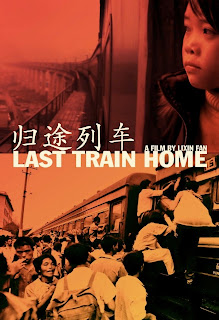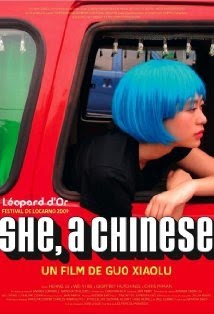
If you have any interest in learning about or experiencing a foreign country (assuming China is a foreign country to you), you'll get a lot from this film. Roger Ebert, although not a great resource when it comes to East Asian cinema,
wrote "
we absorb more information about the lives of ordinary people in everyday China than in any other film I've seen". Ebert hasn't seen a lot of Chinese films but his observation is still to the point.
The Story of Qiu Ju seems like it is utterly realistic and revealing and that's what is magical about it. Much of the film, most of it in fact, that involves people
surrounding the main characters is captured with a hidden camera and is quite candid and authentic. The scenes focused on the main characters are also shot (and performed) in such a way as to suggest they aren't staged in any way. But don't be fooled. This is the genius trickery of director
Zhang Yimou's sweet homage to the days of yore.
A very pregnant Qiu Ju and her young husband are chili farmers and want to build a storage shed for their over-productive crop. They go to the village chief to ask permission and are denied on the grounds that the land is for farming, and that if everyone built a building there would be nothing to eat. Qiu Ju's husband points out that the chief isn't a farmer, doesn't understand farming, and is only raising hens. The chief hears the final remark as a humiliating insult about the fact he has only four daughters—and no sons to carry on his family name—so he kicks Qiu Ju's husband in the balls.
Qiu Ju's story is a journey for justice as she perceives it. She is worried at first that her husband's injury may leave them condemned to the
one child policy for good, but her husband soon recovers and the film then chronicles her efforts to get the village chief to apologise. That is the only justice she wants. The chief offers to let Qiu Ju's husband kick him in the balls but he won't apologise. Qiu Ju takes her case up the hierarchy to the district administrators, the county, the city, and the party, with the result always being the same: The village chief will pay for medical bills and loss of work and Qiu Ju and the chief are instructed to engage in some self-criticism in order to regain harmony. And by harmony they mean Qiu Ju should drop the case. Everyone, all the way to the top, is sympathetic to her but they won't ask the chief to apologise because he is the chief and he would lose face and his ability to keep chiefing would be compromised. It's a subtle but huge point in Chinese culture.
This film is so good on so many levels it's crazy. One of the head-scratching wonders of the film is it's portrait of harmonious village life while this minor conflict is going on. The first reaction most people will have to this film is "Are people really that nice and polite to one another"? It's almost a documentary capturing rural Chinese life in the 1990's in all its humble and honest simplicity. It's also an insightful observation on the changing bureaucracy in China, both vertically and horizontally over time. It's a parable which ponders whether the law, the wisdom of elders, or common courtesy offers the best solution to disputes. Zhang Yimou is fascinated, and maybe discouraged (maybe not), by the changing Chinese culture and weaves a grand metaphorical tale for viewers to consider from many angles.
Gong Li's performance is amazing. One of the most beautiful women in the world, she plays this role very down to earth and understated, not to mention pregnant, dressed in peasant clothing, and with a scarf wrapped around her neck and much of her face most of the time. It's not a glamorous role. She is one of only a few professional actors in the film and does a remarkable job melting in among all the
real people.
The Story of Qiu Ju is a slow paced, somewhat repetitive film but it's all the better for it. Viewers are treated to a heart-warmimg world of relationships which are themselves slow-paced and repetitive. It would be a shame to rush through it.
★★★★★
Director:
Zhang Yimou
Starring:
Li Gong, Peiqi Liu, Liuchun Yang, Kesheng Lei, Zhijun Ge
IMDb
Wikipedia
 I recommend this "documentary" to everyone. There are glowing and heartfelt reviews of it aplenty, and I don't object to any of the ones I've read. The film made me cry and it stayed with me for a long time, but there is one thing that bothered me about it: its complete lack of any joy whatsoever.
I recommend this "documentary" to everyone. There are glowing and heartfelt reviews of it aplenty, and I don't object to any of the ones I've read. The film made me cry and it stayed with me for a long time, but there is one thing that bothered me about it: its complete lack of any joy whatsoever. 

















